Key Takeaways
AI agents for customer support reduce operational costs by 30-40% while delivering first-year ROI of 200-400% with payback periods averaging 6-9 months.
Organizations automate 70-80% of routine customer inquiries, freeing human agents to focus on complex problem-solving and strategic customer interactions.
AI-powered support systems provide 24/7 multilingual assistance across all channels, reducing average response times from hours to seconds and improving customer satisfaction scores by 25-40%.
Businesses achieve unlimited scalability without proportional staffing increases, handling peak demand periods and seasonal spikes while maintaining consistent service quality.
Real-time analytics and sentiment analysis enable proactive issue resolution, reduce customer churn by 25-35%, and provide actionable insights for continuous service improvement.
Transform Customer Experience with an AI Agent for Customer Support
An AI agent for customer support is revolutionizing the way businesses manage customer interactions, with 73% of businesses reporting faster response times and 64% reporting lower operating costs in just one year.
AI has become such a powerful mechanism to support customer service that recent industry studies revealed that companies using AI agents for customer service or AI agent for customer support can field 80% of routine inquiries without human intervention and customer satisfaction improves, on average, by 33%.
From a services market perspective, the global AI powered customer support market is projected to reach $47.82 billion in 2030 and continues to grow as more businesses see the transformative power of intelligent automation on service delivery and operational efficiency.

The Customer Support Challenges Businesses Face
Overwhelmed support teams and slow response times:
Support teams today feel unprecedented pressures as the numbers of customer inquiries rise to levels never seen before. Average response times for email support exceed 12 hours, and live chat support exceeds 5 minutes, leading to customer dissatisfaction and customers that abandon the interaction. Support agents dedicate up to 70% of their time to managing rote inquiries, which does not leave much time for complex inquiries requiring problem solving. During peak times, bottlenecks occur and wait times for connecting support agents can take as long as a few hours, which greatly impairs customer experience and brand impression.
High operational costs and staffing limitations:
Traditional AI agent for customer support and models require huge investments in staffing, infrastructure, and training programs. The average cost per customer interaction falls between $5 to $15, and voice support costs significantly more. To complicate matters, businesses face recruitment issues, turnover rates from 30-45% annually, and an ongoing training requirement. Building a support operation increases costs if support is increased as well, which makes growth both expensive and complicated.
Poor customer satisfaction and declining loyalty:
Delays and inconsistent customer service break trust. Research suggests that 89% of customers will switch to competitors after a worst service. Long wait times for resolutions, requesting customers to repeat the same information multiple times, and a lack of personal interaction does not endear your customers to you. An estimated $75 billion annually is lost due to poor customer service, and 67% of customer churn is avoidable with better support experiences.
Inconsistent support across channels:
The customer communicates to you through multiple channels, such as email, chat, social media, phone, and mobile app. Consistent service quality across each of those channels is difficult. As agents do not have visibility into a complete customer story, information is often siloed, and they hear customers repeat the same information over and over again. This lack of a complete customer story damages customer relationships and operational efficiency, and 70% of customers expect this experience to be continuous, regardless of the point of contact.
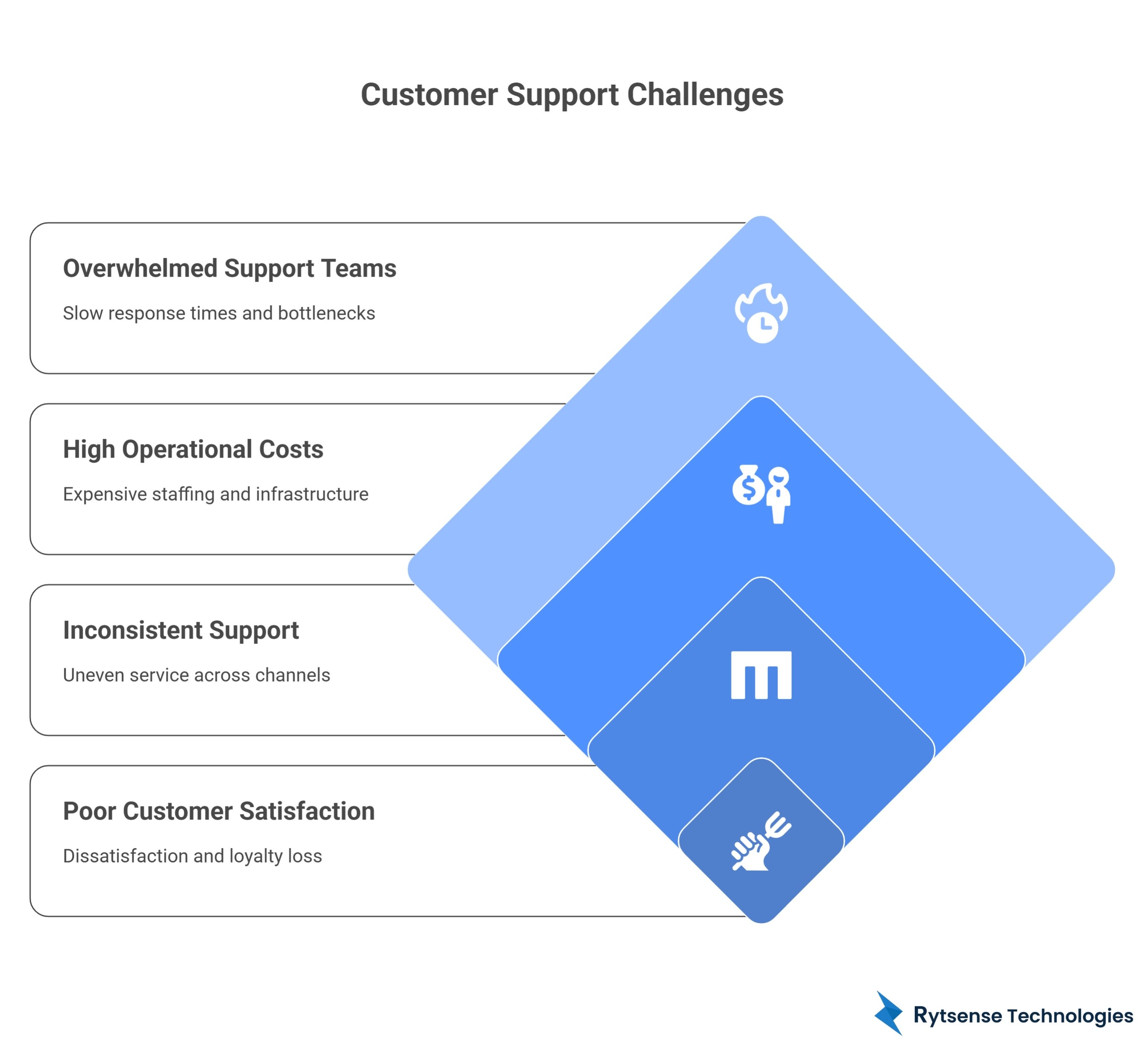
Why Your Business Needs an AI Agent for Customer Support
The ROI of AI Agents for Customer Support - Reducing Costs and Increasing Revenue:
The implementation of the best AI agents for customer support produces a demonstrable financial return. Companies will save between 30-40% in operational expenses as a result of automation of low-value, routine tasks. Average cost per interaction can drop to between $0.50 and $2.00 (i.e. saving 70-90%) when compared to human-only support. AI agent for customer support can have 10,000+ simultaneous conversations, introducing no capacity constraints while illustrating no corresponding increase in costs.
The revenue impact of AI customer support agents goes far beyond reducing operational costs. With instant responses and always-on assistance, businesses typically see a 25–35% increase in conversion rates, along with a 30% reduction in cart abandonment. AI-powered customer service also boosts average order value by delivering personalized recommendations based on user behavior and intent in real time. Most organizations experience a 200–400% ROI in the first year, with the investment often paying for itself within 6–9 months. This makes AI support automation one of the most cost-effective strategies for improving customer satisfaction and driving revenue growth.
How AI Agents Improve Customer Satisfaction and Loyalty:
The most effective AI agents for customer support enhance customer experience by providing instant, always-available assistance, maintaining consistent service quality, and delivering highly personalized interactions. Organizations that deploy AI-powered support typically see a 25–40% increase in Customer Satisfaction Scores (CSAT), as customers receive accurate resolutions in seconds instead of waiting hours. Because an AI customer support agent can remember past conversations, preferences, and purchase history, customers enjoy a seamless, context-aware experience that strengthens trust and improves engagement across every interaction.
AI systems have proactive engagement capabilities that enable anticipation of customer needs and remediation of issues before they become problematic, taking a preventive approach that leads to a 30% increase in customer lifetime value and reduced churn rates. Customers enjoy 24/7 availability with instant resolution for any complications that arise. This results in improved Net Promoter Scores and an increase in overall brand support for the given organization.
The Competitive Advantage of AI-Powered Customer Service:
There are significant competitive advantages for organizations that implement AI agent customer support. Early adopters will take market share due to superior customer experience that traditional customer experience models cannot compete with. Winning the "speed to response" advantage of AI will allow for an increase in conversion rates and retaining customer.
AI-powered analytics offer targeted insights into customer behavior, preferences and problems. This analytic engine offers improvements in product offerings, marketing strategies, and other business decisions. Companies utilizing AI agent for customer support measures indicated a 45% faster time-to-market realization related to customer feedback analysis and subsequent identification of product features. The competitive advantage of having a superior customer experience becomes more noticeable by the growing moat competitors must cross to catch up.
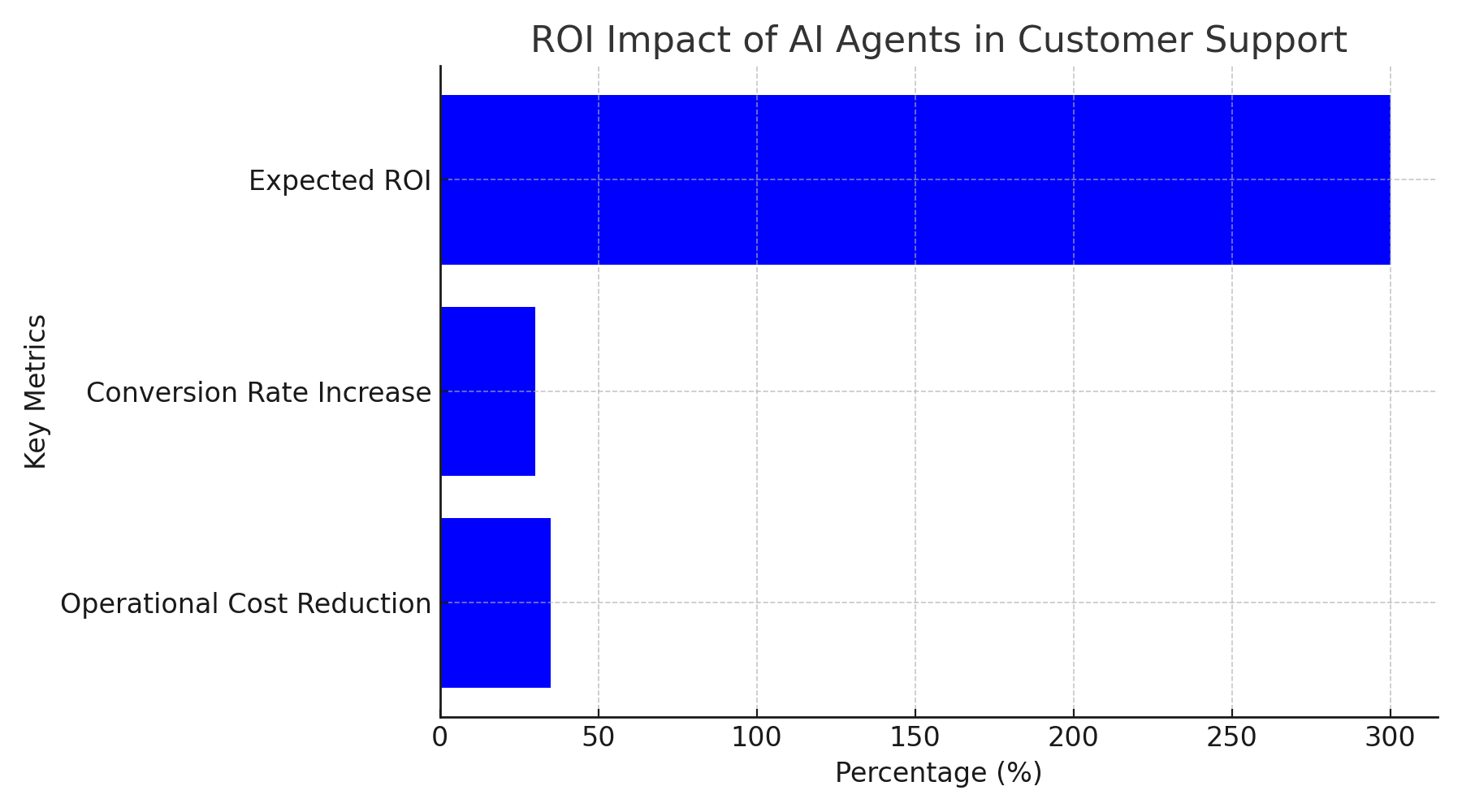
How an AI Agent for Customer Support Enhances Service Quality
Knowing AI-Driven Automation in Customer Support:
AI Agent customer service utilizes natural language processing, machine-learning, and conversational AI to understand and respond to customer inquiries. AI systems analyze unstructured data from text, voice, and images to accurately understand customer intent. Also, AI algorithms continue learning from customer interactions to enhance AI response quality and accuracy with each interaction.
AI agent for customer support may handle tier-1 and tier-2 support inquiries independently (e.g. password resets, account inquiries, order inquiries, and troubleshooting). When tier-3 issues arise, AI agent for customer support use intelligent routing to bring customers to a human expert with complete and actionable context on the inquiry, ensuring that the handoff is seamless without losing prior information.
Seamless Integration of AI Agents with Your Existing Systems:
Modern customer service AI agents can easily connect to existing technology stacks such as CRM systems, helpdesk software, knowledge bases, and corporate applications. The architecture is API based, allowing real-time synchronization of data across platforms. AI agents can also pull customer data, order history, product information, and other support documentation to deliver accurate, contextualized responses.
Integration capabilities reach across omnichannel platforms for guaranteed consistency across web chats, mobile apps, email, social media and voice-based channels. A single unified system becomes viable without the risk of data silos, and ensures the continuity of conversation whether customers change channels. Implementation can take anywhere from 2 to 8 weeks depending on requirements, and involves minimal disruption to existing business operations.
Real-Time Data Insights and Actionable Analytics for Customer Service Teams:
AI customer service agents will develop a comprehensive set of analytics regarding customer interactions to pull sentiment trends, common issues, resolution patterns, etc. Real-time dashboards will allow visibility into support performance, average time to respond, resolution rates, or customer satisfaction rates. Supervisors may spot and know opportunities for training, bottlenecks in processes, and new emerging issues in real time.
Predictive analytics will expose trends in support volumes, that allows you to proactively allocate resources and staffing to prepare for support volume trends. Also, sentiment analysis will identify at-risk customers who will need special attention right away. All of these insights will drive continuous improvement in service delivery, product and service quality and customer experience strategies.
Also Read:
Top 8 Use Cases of AI Chatbots in BusinessCommercial Use Cases for AI Agents in Customer Support
Automating Repetitive and High-Volume Customer Interactions:
Most effective AI customer support agents are helpful for repetitive queries that eat up 60-70% of the support's total capacity. Common use cases appeal for account information, password resets, billing inquiries, and frequently asked questions. When customer interactions are automated, those responses no longer require a wait for customers, and human agents can focus on complex problem-solving.
The self-service function of an intelligent VA allows users to realize issues without human involvement. The AI agent for customer support lets users understand troubleshooting steps, completing forms, and other account maintenance tasks in a conversational style. This effort lessens the overall tickets volume by 40-50% and improves customer satisfaction by solving account issues immediately.
Personalized Recommendations and Upselling with AI Support Agents:
AI technology is able to analyze customer profiles, purchases, and browsing behavior in order to supply personalized product recommendations while the support interaction is taking place. When customers ask about product and or service availability, AI agent for customer support suggests upgrades, alternative items, or relevant items based upon individual preferences and needs.
Leading customers to product recommendations based upon their inquiry or interaction is called contextual selling. Contextual selling efforts can increase a business' average order size by 20-35% without coming off as overly pushy. Customers appreciate recommendations that are relevant to their issue and that fit their needs, especially when buying again. AI agent for customer support identifies the best cross-selling opportunities through a review of the customers' interactions during customer support to maximize potential for conversion.
Order Tracking, Returns, and Fulfillment Assistance:
AI voice agent for customer service have capabilities to automating order-related requests by providing tracking updates, delivery notifications, and automating returns. Customers may check the status of existing shipments in real-time without assistance from an agent. AI systems register and process incoming return requests, produce return labels, and initiate refunds according to predetermined policy parameters.
Also, AI agent for customer support may draw on merged inventory and logistics systems to offer right delivery time estimates, address shipping inquiries, and align with execution centers. With automation, processing times of orders are reduced from hours to minutes, effectively increasing both customer satisfaction and operational ability.
Proactive Issue Solution and Technical Support with AI Agents:
Predictive monitoring can resolve potential issues before customers realize there is an issue. AI agent for customer support can initiate proactive outreach with solutions, thus circumventing a negative experience. In technical support scenarios, AI systems can eliminate technical support issues in part by prompting customers to follow a series of diagnostic procedures, configuration changes, and troubleshooting steps using an interactive dialogue.
Because of the integration of knowledge bases, AI agents have real-time access to technical documentation, user manuals, and other solution repositories. Complex technical inquiries receive accurate and detailed responses without delays. If a response from a human being is indicated, the AI agent for customer support will provide specialists with information to fully diagnose the customer's issue which increases resolution times.
Identifying Customer Sentiment to Improve Retention:
Real-time sentiment analysis helps to spot customer confusion, satisfaction, and frustration during interactions. AI systems then adapt their communicative behavior, escalate to a human agent when needed, and flag at-risk customers for targeting in retention initiatives. Tracking sentiment across all interactions also provides early warning indicators of possible churn.
When sentiment is aggregated at the level of products and quality of service over a period, the business can identify problems with product or service, recognize gaps in service, and identify potential improvements. This proactive approach helps the business address problems systemically, rather than reactively, offsetting widespread dissatisfaction. Using intelligence-based approaches through timely interventions and ongoing service improvements can reduce churn rates by 25 - 35%.
AI Agents for Customer Support in Multilingual and Global Operations:
AI developer services for agents enable businesses to provide customer support in 100+ languages while not increasing staffing costs. These communication AI agents allow for native-language experiences with cultural and linguistic differences. These communication AI agents also properly support translation while maintaining proximity to conversation context and meaning across languages, thus eliminating communication barriers.
Businesses operating globally can ensure a consistent quality to their service regardless of region and time zone. With multilingual support 24/7, businesses can provide customer support to other markets without additional proportional staffing costs. Customer satisfaction improves when they can receive immediate support in their chosen languages, along with increased penetration into the market due to the multilingual opportunity operating in diverse geographic populations.
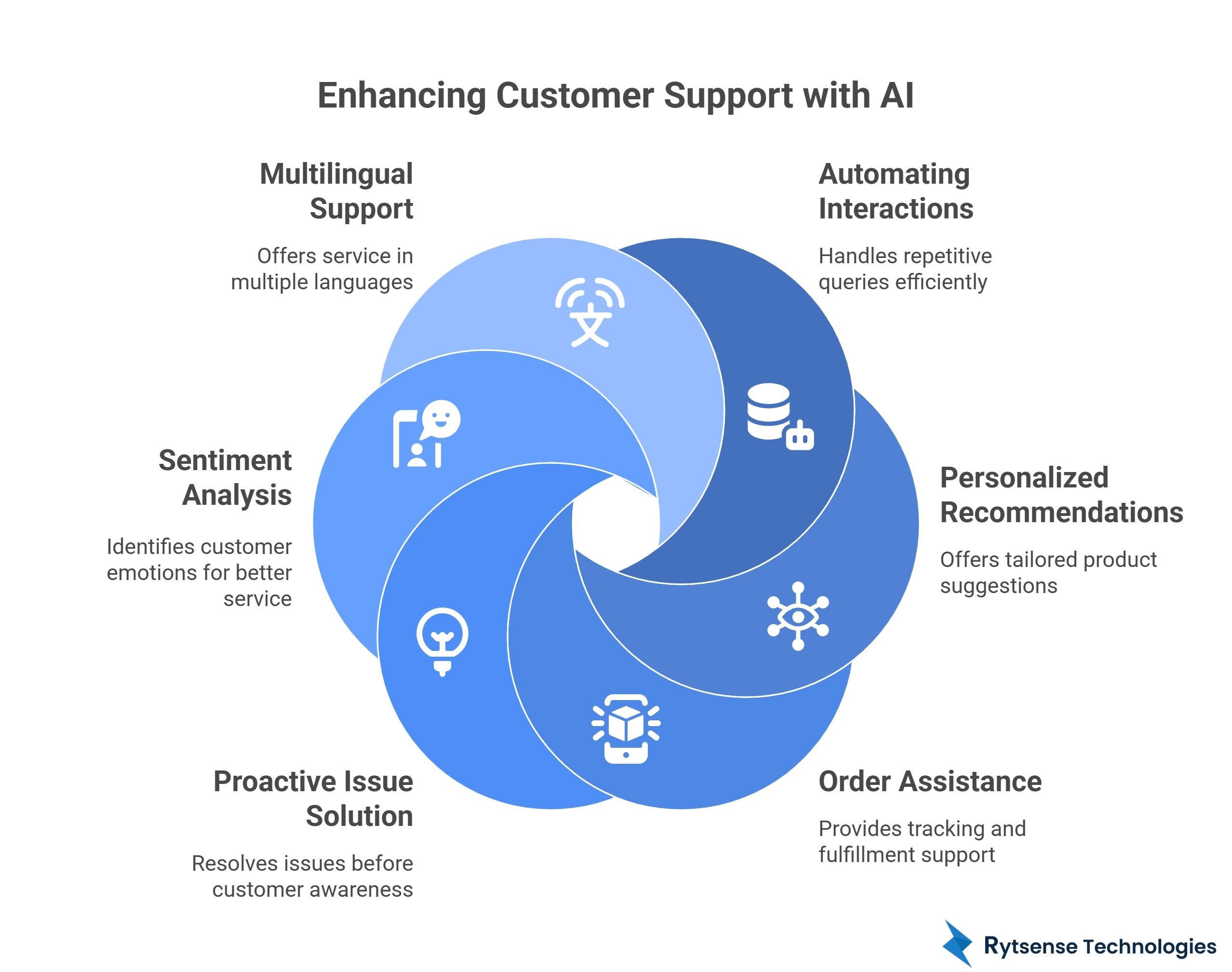
Don’t Let Customer Support Become a Bottleneck.
Rytsense AI Agents help you automate 70–80% of support tasks while improving the quality of human interactions.
AI Agent Use Cases by Industry for Customer Support
Retail and E-commerce:
AI agents respond to inquiries about products, sizes, inventory checks, and order changes instantly. Customers receive personalized shopping support, reducing cart abandonment rates by 30%. Returns processing, issuing exchanges, and refunds inquiries automate completely and improve operational efficiency by 45%. The AI systems also analyze purchase behaviors to make product suggestions based on purchase patterns, which increases average order values. Discounted support costs, higher conversion rates, improved customer satisfaction, and increased revenue per customer engagement are all benefits.
Banking and Financial Services:
AI agents respond to account balance inquiries, transaction history, payment processing, and fraud alerts instantly. Loan applications, credit card activations, and statement requests automate without compromising security. The AI systems recognize suspicious activity and assist the customer through the security process. Benefits of these systems comprise a reduction of at least 50% in call center volumes, consistent verification processes in place to improve security, regulatory compliance, and customers have access to their accounts on a 24/7 basis, all without increasing staff levels.
Insurance:
Policy inquiries, claims status updates, explanations of coverage, and premium calculations would be answered instantly by AI agent for customer support. AI-powered agents can even guide the user through the claims filing process while they upload documents and AI intelligence is also applied to pre-fill forms. Renewal reminders, policy changes, and beneficiary modifications are fully automated. Benefits of this type of interaction would include claims processing that is 60% faster, lower administrative costs, loyal customers satisfied by better service, and enhanced policy sales with intelligent recommendations.
Healthcare:
Appointment scheduling, prescription pad refill requests, insurance check or verification, and test result notifications would be handled or automated by AI-powered agents. Patients will receive medication reminders, follow-up instructions after visiting clinic, and preventive care suggestions. AI systems may classify inquiries and urgent issues to medical professionals, while the AI agent handles the administrative request. AI-powered agents would assist the health provider or administrative assistant with scheduling appointments while removing their administrative burden, thereby improving the delivery of patient education, lowering no-show rates, and improving coordination of care across teams of residents, consultants, and attending physicians.
Travel & Hospitality:
Booking amendments, reservation confirmations, check-in assistance, and loyalty program inquiries would be answered immediately by AI. AI agents would provide recommendations about destinations, and travel issues related to the concern or destination, hotel, or airline would be referred to the appropriate human for resolution. Customer complaints and service recovery frameworks would be automated with intelligent algorithms for compensation. Benefits from these AI interactions would include a 40% drop in shopping abandonment, better occupancy rates from dynamic pricing recommendations, guest satisfaction and loyalty, and 35-45% operational cost savings.
Telecom:
AI agent for customer support will automate network troubleshooting, explain your bill, upgrade your plan, and activate devices. For technical issues, AI will lead you through diagnostic processes and create a ticket if your issue is not resolved. AI systems will proactively inform you of service disruption along with the estimated time for restoration. Benefits include a 55% reduction in truck rolls through remote issue resolution, improved service experience resulting in less churn and higher plan upgrade conversion rates, and reduced operational costs.
SaaS & Technology:
Account provisioning, explain features, assist with integrations, and account billing questions will be addressed in real-time using AI. For common issues, access to technical documentation, API questions, and troubleshooting procedures will be provided by the AI agent for customer support. AI agents will monitor patterns of product use, identifying customers who require additional training or lack product adoption. Benefits include improved product adoption, quick time-to-value for customers, reduced support cost per user, and increased revenue through intelligent recommendations for upgrades.
Education and Smart E-Learning:
Course enrollment, access to technical issues, assignment submission, and grade-related inquiries will be automated through AI agent for customer support. Students can get a list of recommendations for studying, reminders about due dates, and resources based on learning patterns. Admin processes will function autonomously. The benefits comprise improved engagement, less workload for faculty, best learning outcomes through customized or personalized support, and scalable cost-effective solutions for increasing enrollment.
Logistics and Management of Supply Chain:
Shipment tracking, delivery scheduling, documentation requests, and customs clearance inquiry are automated with a simple response from AI. Carriers receive assistance with routing optimization, load planning, and compliance guidance. Exception management, as well as delayed shipments notifications, automate all with proactive customer communication. The benefits gained from this technology include effective on-time delivery, low customer service cost, visibility of the supply chain, equipment utilization, and customer satisfaction with proactive communications.
Real Estate:
When responding to leads about various properties, viewing appointments scheduling, application status updates, and maintenance requests, you may get an AI response in seconds. Prospective tenants immediately receive personalized property alerts based on their preferences and budgets. Renewal notifications, rent payment reminders, and document requests fully automate. Benefits from AI technology lead to increased sales conversions, reduced time required to close open vacancies, improved tenant satisfaction, and lower property management costs due to automation.
Manufacturing:
AI agent for customer support manage order status queries, specification requests, delivery schedules, and quality documentation. Instructional assistance for products with installation, maintenance procedures, or warranty claims are facilitated via guided assistance. Ordering spare parts, processing RMAs (Return Merchandise Authorizations), and coordinating suppliers utilize intelligent automation. Benefits attributed to AI investment result in lower customer service costs, improved accuracy, better customer relationships, and improved time to resolution for technical issues.
Government and Public Services:
AI-enhanced customer service platforms automate common tasks such as submitting permit applications, renewal of licenses, registering a complaint, or requesting information. Citizens will have support for complex transactions and document requirements, or time frames for processing. Information will be instantly accessible regarding office hours, service availability, and appointment scheduling. Benefits include improved citizen satisfaction, lower administrative costs, increased access to services, and lower routine processing times.
Media & Entertainment:
Receive instant AI responses for subscription changes, content recommendations, technical issues, or billing questions. Identify potential account sharing, assist with parental controls, and automate the device management process. Benefits include improved user experience that reduces membership cancellations, improved content engagement, lower support costs, and increased conversion for subscriptions based on intelligent recommendations.
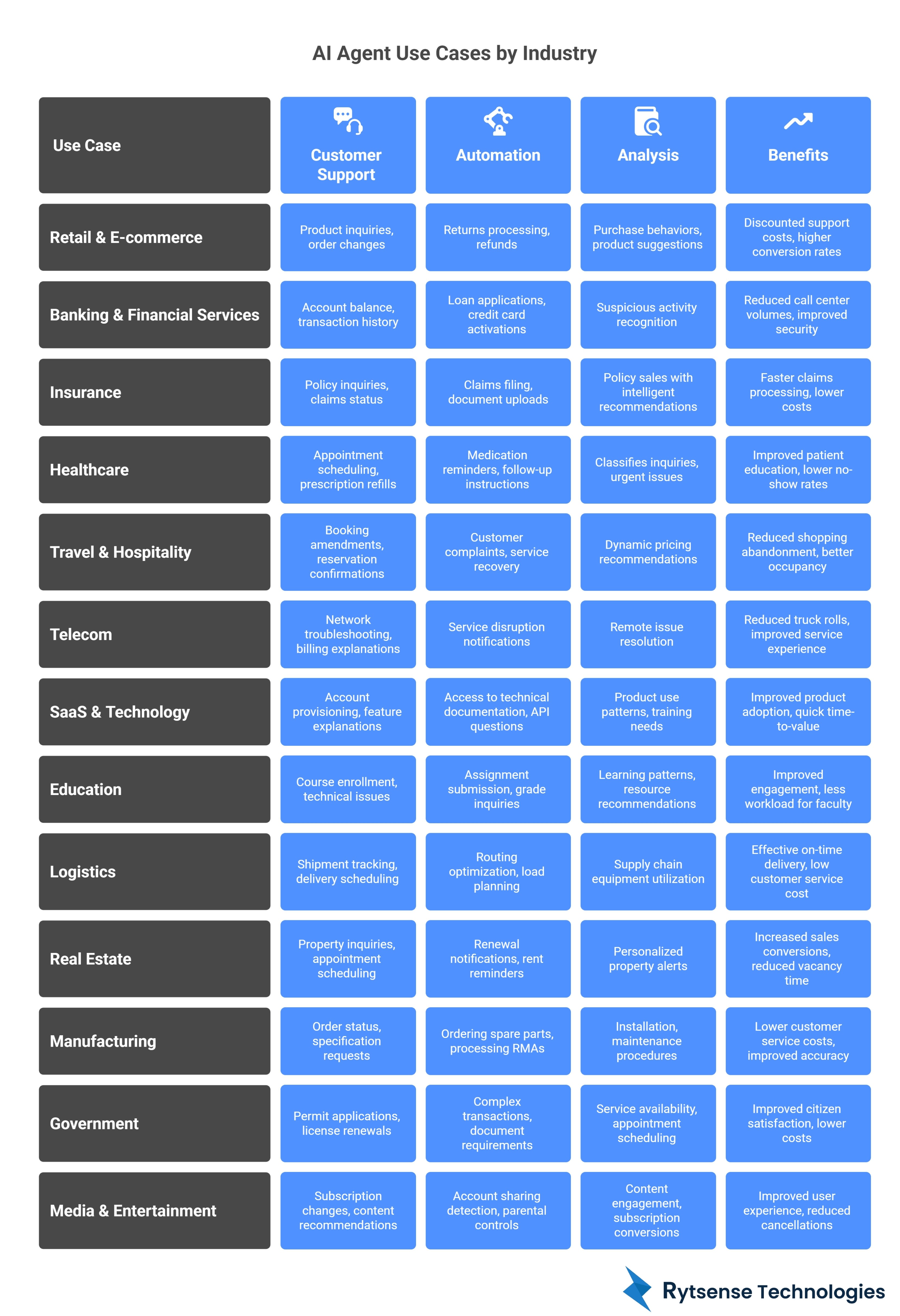
Key Benefits of AI Agents for Customer Support
Omnichannel Support Across Web, App, and Messaging Platforms:
AI agent for customer support can provide a seamless experience with consistent experiences across all customer conversation points including a website chat widget, mobile app, social media platforms, email, and messaging apps like WhatsApp and Messenger. Customers can shift devices or platforms and conversations resume across channels. This unified delivery will reduce frustrating redundancies and keep customer journeys in context.
24/7 Availability and Continuous Lead Engagement:
AI technology is always online; it doesn't take breaks, doesn't celebrate holidays, and has zero limitations based on time zones. Customers get immediate help at any time, which reduces the chances of lost opportunities due to unavailability. Inquiries at late hours, support requests on weekends, or emergencies that arise after hours are addressed instantly. AI availability increases lead capture rates by 40% and positively affects customer satisfaction scores.
Scalability Without Increasing Headcount:
AI agents can take unlimited concurrent conversations, which allows companies to build their support operations without adding headcount. Seasonal demand increases, product launches, or promotional campaigns may receive the necessary information without needing temporary hires.
Less Response Time and High Conversion Rates:
AI agent for customer support will answer right away, eliminating the wait times that create customer frustration and, quite often, abandoned transactions. The average response times move from hours and minutes to just a few seconds. This immediacy raises lead conversions by at least 30-45% since customers receive their information just as they are deciding to buy. The faster a customer receives their answer, the shorter the resolution and interaction times, increasing customer satisfaction and return rate.
Booming Collaboration Between AI and Human Agents:
Intelligent routing ensures complex inquiries are delivered to the right human specialists including the full context and information from AI interactions. Human agents automatically receive comprehensive customer histories and attempts to resolve their requests, as well as pertinent documentation. This model of collaboration capitalizes on the value of AI in efficiency and human agents in expertise, resulting in better customer experiences and increasing the productivity of agents by 35-50%.
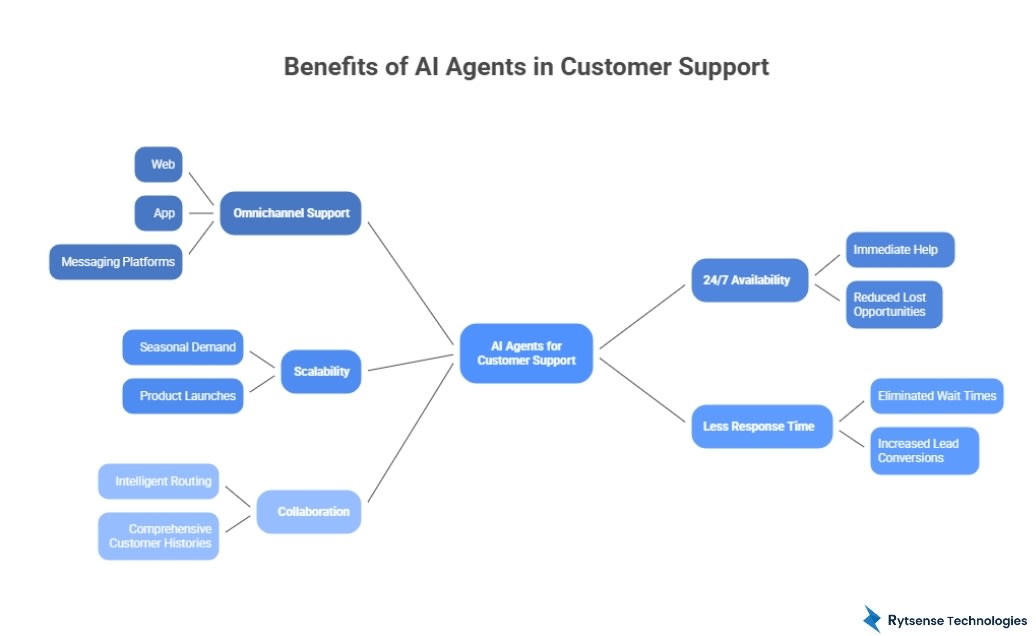
Choosing the Right AI Agent for Customer Support
Why Rytsense AI Agent Stands Out for Customer Service:
Rytsense AI agent for customer support offers enterprise-grade customer service automation and AI development services with advanced natural language understanding, effective system integrations, and customization within specific industries. The Rytsense platform is a single solution that supports conversational AI, machine learning, and prediction analytics, forming a comprehensive platform designed for commercial use at scale and effectiveness to the organization.
The key differentiators include superior precision of intent recognition, preservation of context from complex multi-turn conversations, and native integration with key CRM, helpdesk, and business systems. Rytsense technologies supports 100+ languages while also retaining cultural nuance, allowing global support operations and precision in local flavors. They offer AI agent development services using a hybrid approach of AI and Human, the platform enables escalations with a clear move of escalation while maintaining contextual awareness of the complete customer conversation.
Key Features that Make AI Agents for Customer Support Commercial-Ready
| Feature Category | Capabilities | Business Effect |
|---|---|---|
| Natural Language Processing (NLP) | Intent recognition, entity extraction, sentiment analysis | 95%+ accuracy in understanding customer queries |
| Integration Architecture | Pre-built connectors for CRM, helpdesk, payment systems | Deployment in 2-8 weeks vs. 3-6 months custom development |
| Multi-channel Support | Web, mobile, social media, voice, email unified platform | Consistent experiences across all customer touchpoints |
| Analytics and Reporting | Real-time dashboards, predictive analytics, performance metrics | Data-driven optimization and ROI measurement |
| Security & Compliance | Enterprise-grade encryption, GDPR/HIPAA compliance, audit trails | Risk mitigation and regulatory adherence |
| Customization | No-code conversation design, brand voice training, workflow automation | Tailored experiences without technical dependencies |
Implementation Road for Integrating AI into Your Support Ecosystem:
Phase 1 (Weeks 1-2): Source and Planning
- Current support process assessment
- Use case identification and prioritization
- Integration requirements documentation
- Success metrics definition
Phase 2 (Weeks 3-4): Configuration and Training
- AI agent conversation flow design
- System integration and data mapping
- Brand voice and response training
- Knowledge base integration
Phase 3 (Weeks 5-6): Testing and Changes
- User acceptance testing
- Performance optimization
- Edge case handling
- Security validation
Phase 4 (Weeks 7-8): Display and Monitoring
- Phased rollout to customer segments
- Performance monitoring and adjustment
- Agent training on AI collaboration
- Continuous improvement implementation
Customer Success Stories and Case Studies:
A top retail e-commerce organization implemented an AI agent for customer support, yielding a 42% reduction in support costs, while increasing overall customer satisfaction ratings by 38%. The solution now handles 78% of inquiries automatically, and average response time reduced from 8 to 12 minutes to seconds. The company also experienced a return on investment exceeding 325% in its first year.
A multinational banking organization deployed AI support agents across 12 countries, providing 24/7 multilingual support without needing proportional staff expansion. Call center volume reduced by 51%, and overall customer satisfaction improved by 29%. The bank handles approximately 2.3 million automated interactions a month, realizing $8.7 million in annual cost savings.
A SaaS company took management to the next level by integrating AI agents into their support ecosystem. The implementation increased overall product adoption rates by 44% by providing users with proactive guidance and immediate technical assistance. The AI agent for customer support reduced inbound support ticket volumes by 46%, thereby allowing human agents to manage more advanced customer success initiatives. The first year cost of churn for this organization decreased by an additional 31%.
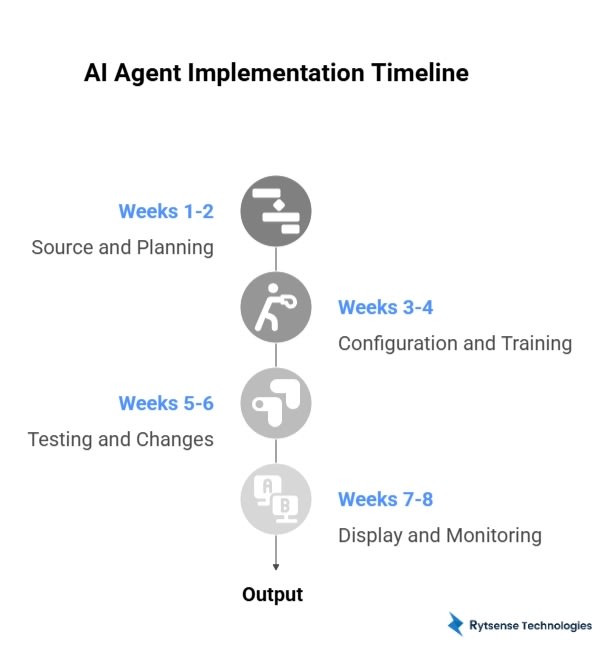
Maximizing ROI with AI Agents for Customer Support
Major Practices for Successful AI Integration and Adoption:
AI integration and adoption require a structured, step-by-step approach that ensures measurable outcomes, operational efficiency, and continuous improvement.
Begin with a use case that has high volume and low complexity to establish near-term success and to build organizational confidence. Clearly define the success matrix that includes, but is not limited to, cases resolved by the AI agent for customer support, cost savings, speed to response, customer satisfaction, and case resolution. Get buy-in from support teams early on in the AI planning process including to get helpful operational information.
Continually train with actual cases to truly drive AI effectiveness and accuracy with customer support. Routinely review conversation files to see where you're not covering some important facts and/or the quality of the responses handled by the AI. Gather customer feedback on AI interactions during their engagements and use that information to improve.
Set escalation protocols that are clear and get more complex issues routed to human agents as quickly as possible. Monitor AI-human transitions to manage handoffs and ensure context around the conversation is maintained. Finally set up governance policies around quality of AI responses, brand voice, and compliance.
Teaching and Training Human Agents to Work Effectively with AI Systems:
Teach your support personnel on AI capabilities, limitations, and key practices for working together. Explain that AI is planned to improve the effectiveness of your human agents and not to replace them. Train your agents to deal with escalated complex issues that draw on their expertise and problem-solving ability.
Build all-new skill sets on empathy, relationship building, and thoughtful customer engagement. Enable your human agent to efficiently review AI conversation histories and understand the context prior to speaking with customers. Establish a feedback loop whereby your agents participate in training AI systems by flagging incorrect AI responses or leaking knowledge gaps.
Measuring Performance and Business Impact of AI Customer Support Agents
| Metric Category | Key Performance Indicators | Target Benchmarks |
|---|---|---|
| Operational Efficiency | Automation rate, cost per interaction, ticket volume reduction | 70-80% automation, $0.50-$2 per interaction, 40-50% volume reduction |
| Customer Experience | Response time, resolution time, CSAT score, NPS | <10 second response, 60% reduction in resolution time, 80%+ CSAT |
| Business Impact | Cost savings, revenue increase, conversion rate improvement | 30-40% cost reduction, 25-35% revenue increase, 30-45% conversion improvement |
| AI Performance | Intent accuracy, escalation rate, conversation completion | 95%+ accuracy, <20% escalation rate, 85%+ completion rate |
| Agent Productivity | Cases per agent, average handle time, utilization rate | 50% increase in capacity, 35% AHT reduction, 80%+ utilization |
Use dashboards to track these metrics or results in real-time, allowing visibility into AI agent for customer support, success and business impact. Do a monthly check or review to identify trends, where improvements can be made, and modify your actions in accordance with what the data says. Assess and compare metrics from pre-AI to post-AI to develop the impact of your transformation project and provide a clear justification for continued support for transformational technology.
Conclusion
The first step in providing AI agent for customer support is a transformational project, that will change how your business operates, with transformational benefits including improved efficiency, reduced costs and improved customer satisfaction and engagement, while building sustainable competitive advantage in the market.
Later, organizations who adopt AI agent for customer support will be better prepared to own their future in an increasingly digital, customer-driven market where service excellence is the value where brands define, distinguish and differ themselves, their value and service expectations. With the right combination of technology, to be implemented strategically, and continuously improve, businesses will be able to deliver extraordinary customer experiences, consistently and at scale, with operational efficiencies and improved profit.
Ready to Transform Your Customer Support Experience with AI?
Deliver faster responses, reduce support costs, and improve customer satisfaction with intelligent AI-driven support automation.
Meet the Author

Karthikeyan
Connect on LinkedInCo-Founder, Rytsense Technologies
Karthik is the Co-Founder of Rytsense Technologies, where he leads cutting-edge projects at the intersection of Data Science and Generative AI. With nearly a decade of hands-on experience in data-driven innovation, he has helped businesses unlock value from complex data through advanced analytics, machine learning, and AI-powered solutions. Currently, his focus is on building next-generation Generative AI applications that are reshaping the way enterprises operate and scale. When not architecting AI systems, Karthik explores the evolving future of technology, where creativity meets intelligence.